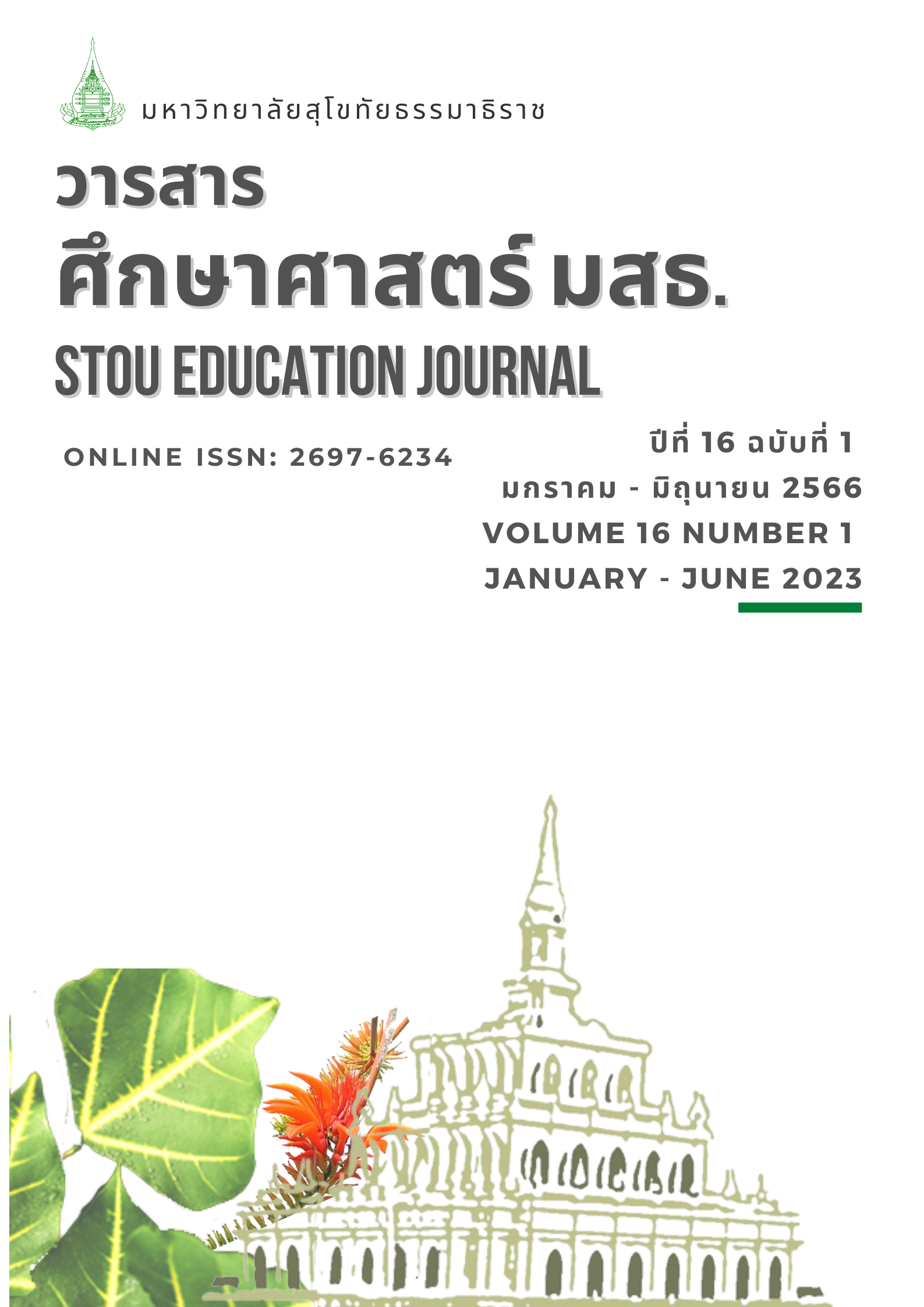The Effects of Inquiry Instruction together with Scaffolding Technique on Science Learning Achievement and Scientific Explanation Ability of Grade 8 Students at Her Royal Highness Princess Soamsawali School in Pathum Thani Province
Main Article Content
Abstract
The purposes of this research were to 1) compare science learning achievement and scientific explanation ability of Grade 8 students who learned by inquiry instruction together with scaffolding technique and students who learned by traditional instruction, and 2) compare the scientific explanation ability of the students, before and after learning through inquiry instruction together with scaffolding technique. The sample consisted of 87 Grade 8 students in 2 intact classrooms of Her Royal Highness Princess Soamsawali School who studied in the second semester of the academic year 2021, obtained by cluster random sampling. One class was randomly assigned as an experiment group and another class was assigned as a control group. The research instruments were 1) lesson plans based on inquiry instruction together with scaffolding technique 2) lesson plans based on traditional instruction 3) a science learning achievement test, and 4) a scientific explanation ability test. The statistics used for data analysis were the mean, standard deviation, and t-test. The research findings showed that 1) science learning achievement and scientific explanation ability of the students who learned by inquiry instruction together with scaffolding technique was higher than the students who learned by the traditional instruction at the .05 level of statistical significance, and 2) scientific explanation ability of the students was significantly higher than their pre-learning counterpart ability at the .05 level of statistical significance.
Article Details
References
กิ่งฟ้า สินธุวงษ์ และ สุจินต์ วิศวธีรานนท์. (2561). พื้นฐานทางจิตวิทยาของการเรียนการสอนวิทยาศาสตร์.ใน ประมวลสาระชุดวิชาสารัตถะ วิทยวิธีและธรรมชาติของวิทยาศาสตร์. (หน่วยที่ 6-10, น. 6-116). มหาวิทยาลัยสุโขทัยธรรมาธิราช.
เขมรัฐ จุฑานฤปกิจ, เอกภูมิ จันทรขันตี, และ สุรศักดิ์ เชียงกา. (2561). การจัดการเรียนรู้โดยใช้กระบวนการสืบเสาะทางวิทยาศาสตร์แบบ 5 ขั้น เพื่อพัฒนาการสร้างคำอธิบายเชิงวิทยาศาสตร์ในวิชาฟิสิกส์ เรื่อง การเคลื่อนที่แบบวงกลม ของนักเรียนชั้นมัธยมศึกษาปีที่ 4. การประชุมนำเสนอผลงานวิจัยระดับบัณฑิตศึกษา ครั้งที่ 13 ปีการศึกษา 2561, 1741-1753.
จุฬารัตน์ ธรรมประทีป. (2561). การรู้วิทยาศาสตร์. ใน ประมวลสาระชุดวิชาสารัตถะวิทยวิธีและธรรมชาติของวิทยาศาสตร์. (หน่วยที่ 1 - 5, น.4-10). มหาวิทยาลัยสุโขทัยธรรมาธิราช.
ทิศนา แขมมณี. (2564). ศาสตร์การสอน: องค์ความรู้เพื่อการจัดกระบวนการเรียนรู้ที่มีประสิทธิภาพ. (พิมพ์ครั้งที่ 20). จุฬาลงกรณ์มหาวิทยาลัย.
นพมาศ ปลัดกอง, ปิยดา สมบัติวัฒนา, และ นริสรา พึ่งโพธิ์สภ. (2562). การศึกษาการใช้รูปแบบการจัดการเรียนรู้ด้วยเทคนิคนั่งร้านเสริมเรียนรู้เพื่อส่งเสริมการเรียนรู้ด้วยการนำตนเองของผู้เรียนในระบบการศึกษาทางไกล. วารสารวิจัยทางการศึกษา คณะศึกษาศาสตร์ มศว, 14(2), 130-141.
ภัทรสุดา หาดขุนทด, นวลจิตต์ เชาวกีรติพงศ์, และ ดวงเดือน สุวรรณจินดา. (2561). ผลการจัดการเรียนรู้แบบสืบเสาะหาความรู้ 5 ขั้น โดยเน้นการสร้างคำอธิบายเชิงวิทยาศาสตร์ที่มีต่อผลสัมฤทธิ์ทางการเรียนวิทยาศาสตร์ เรื่อง ลมฟ้าอากาศ และการสร้างคำอธิบายเชิงวิทยาศาสตร์ของนักเรียนชั้นมัธยมศึกษาปีที่ 1 โรงเรียนนวมินทราชินูทิศ สวนกุหลาบวิทยาลัย ปทุมธานี จังหวัดปทุมธานี. วารสารศึกษาศาสตร์ปริทัศน์, 35(1), 113-122.
โรงเรียนวรราชาทินัดดามาตุวิทยา. (2564). รายงานผลสัมฤทธิ์ทางการเรียน ปีการศึกษา 2564. โรงเรียนวรราชาทินัดดามาตุวิทยา.
ศศิกานต์ นิ่มดำ, นวลจิตต์ เชาวกีรติพงศ์, และ ดวงเดือน สุวรรณจินดา. (2562). ผลการจัดการเรียนรู้แบบสืบเสาะหาความรู้แบบสืบเสาะหาความรู้ร่วมกับการใช้เทคนิคการเขียนทางวิทยาศาสตร์ (SWH) เรื่อง อัตราการเกิดปฏิกิริยาเคมี ที่มีต่อผลสัมฤทธิ์ทางการเรียนวิทยาศาสตร์และความสามารถในการสร้างคำอธิบายเชิงวิทยาศาสตร์ของนักเรียนชั้นมัธยมศึกษาปีที่ 5 โรงเรียนขนาดเล็ก สังกัดสหวิทยาเขตชุมพร 2 จังหวัดชุมพร. วารสารศึกษาศาสตร์ปริทัศน์, 35(2), 96-108.
สถาบันส่งเสริมการสอนวิทยาศาสตร์และเทคโนโลยี. (2562). การแถลงข่าวผลการประเมิน PISA 2018. https://pisathailand.ipst.ac.th/news-12
สถาบันส่งเสริมการสอนวิทยาศาสตร์และเทคโนโลยี. (2563). ความฉลาดรู้ด้านวิทยาศาสตร์. https://pisathailand.ipst.ac.th/about-pisa/scientific-literacy.
สันติชัย อนุวรชัย. (2553). ผลของการเรียนการสอนชีววิทยาด้วยรูปแบบการเรียนการสอนสืบสอบร่วมกับกลวิธีการโต้แย้งที่มีต่อความสามารถในการสร้างคำอธิบายเชิงวิทยาศาสตร์และความมีเหตุผลของนักเรียนมัธยมศึกษาตอนปลาย. [วิทยานิพนธ์ครุศาสตรมหาบัณฑิต ไม่ได้ตีพิมพ์]. จุฬาลงกรณ์มหาวิทยาลัย.
สำนักงานคณะกรรมการการศึกษาขั้นพื้นฐาน. (2558). ชุดฝึกอบรมการยกระดับคุณภาพผู้เรียนสู่ความพร้อมในการประเมินระดับนานาชาติ (PISA). http://www.dusitaram.ac.th/download/pisa_training/1_PISA/1
Catherine, C. M. (2002). Learner Support in Distance and Networked Learning Environments: Ten Dimensions for Successful Design. Distance Education. 23(2), 149-162.
Mcneill, K. L., & Krajcik, J.S. (2008). Inquiry and scientific explanations: Helping students use evidence and reasoning. https://www.researchgate.net/publication/
Sampson, V., Grooms, J., & Walker, J.P. (2010). Argument-Driven Inquiry as a way to help students learn how to participate in scientific argumentation and craft written arguments: An exploratory study. Science Education, 95(2), 217-257. https://doi.org/10.1002/sce.20421
Vygotsky, L. (1978). Mind in Society: The developmental of Higher Psychological process. Harvard University Press.


